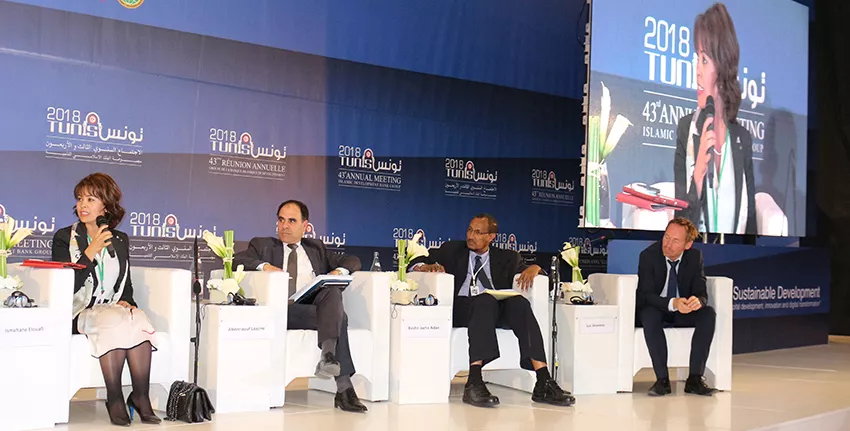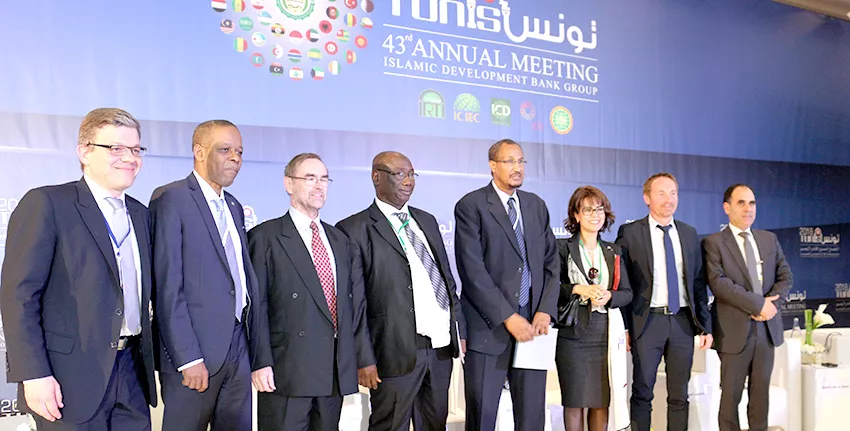Growing more food with less water is key to future food security, say experts
3 April 2018
Over 100 diplomats, scientists and high-ranking officials from the government, non-government and private-sector organizations today called for strong partnerships and more efforts to find effective and innovative solutions to saving freshwater resources and producing more food with less water.
Discussing the issue at the seminar titled “More food with less water: partnership for efficient water use for food security”, the experts also agreed on the need to explore alternative or climate-smart crops that consume less water.
Organized on the sidelines of the 43rd Annual Meeting of the Islamic Development Bank Group (IsDB) by the IsDB, the Swiss Agency for Development and Cooperation (SDC) and the International Center for Biosaline Agriculture (ICBA), the seminar provided a great platform for knowledge exchange on innovative solutions, good practices and success stories that have the potential to be replicated and scaled up by the IsDB or individual member states.
The Sustainable Development Goal (SDG) 2 aims to end hunger and all forms of malnutrition by 2030. It commits to universal access to safe, nutritious and sufficient food. This requires sustainable food production systems and resilient agricultural practices. Agriculture requires large quantities of water for irrigation and various production processes. Water, however, is becoming increasingly scarce and this is certainly the case in many IsDB member countries.
The side event looked at innovations that boost agricultural productivity and improve farmers’ livelihoods while increasing water efficiency. Participants also discussed appropriate partnerships for bringing the innovative solutions to scale, sustaining impacts at the farm level and determining strategies for strengthening human and institutional capacities (including policy reforms) to adapt the innovations to country and region-specific needs and scale them up.
This becomes even more pertinent when taking into account the major investments in rice production in 10 sub-Saharan African countries, where the IsDB has announced to invest in 2018-2019.
In his welcoming remarks, Mr. Amadou Thierno Diallo, Director for Economic and Social Infrastructure at the IsDB, noted the importance of the side event and said: “It is critical, at this time, when the IsDB is positioning itself as a bank of developers to crowd in partners from the research and development community that can innovate solutions that increase water use efficiency of crops like rice, a staple food crop in our member countries, but one that demands much of the limited water available. I welcome specifically the great partnership with SDC and ICBA.”
In setting the scene, Mr. Simon Zbinden, Co-Head of the Global Program Food Security of SDC, observed that: “We cherish the interest of the IsDB to bring to scale the use of solutions such as the model of the Sustainable Rice Platform that SDC has been supporting and that is now helping many smallholders in Pakistan and India produce export quality rice in a water-efficient manner. The crucial partnership with the private sector in this multi-stakeholder initiative is also making farmers make good financial returns from their investments. We are ready to work with the IsDB in bringing this model to scale and replicate key success factors, adapted to the particular local contexts, in other developing countries and regions, especially Africa where the production and consumption of rice is rapidly growing.”
During a panel discussion, Dr. Ismahane Elouafi, Director General of ICBA, said: “Agriculture is using a lot of water resources. In order for agriculture to compete with the other emerging sectors, in terms of access to water, it is crucial that agriculture innovates itself and reduces its water footprint. This will require a serious shift from existing cropping systems to new cropping systems that include new climate-smart crops such as quinoa, millets, amaranthus, and Salicornia (a multipurpose halophyte), which consume less water compared to staple crops and are highly nutritious besides being climate-resilient. Moreover, as we are already doing at ICBA, we need to save our freshwater resources as much as possible and use alternative water resources such as brackish and treated wastewater.”
“It is important to integrate the rice production with other crops, especially vegetables, as this will improve both the nutrition security as well as the income to farming communities. Opportunities for growing rice using saline water should continue to be explored. This is possible but requires making the necessary investments in research and development,” she added.
The Board of Governors of the IsDB Group holds its annual meetings to discuss development issues and institutional matters. This year’s annual meeting, which was held in Tunis, Tunisia, on 1-5 April 2018 offered an ideal platform for decision-makers to discuss challenges and explore opportunities facing its 57 member countries. The meeting and accompanying side-events attracted over 2,000 participants from the public and private sectors as well as academia and civil society.












